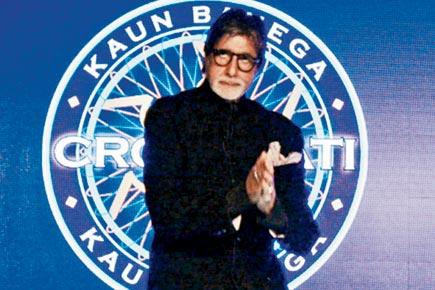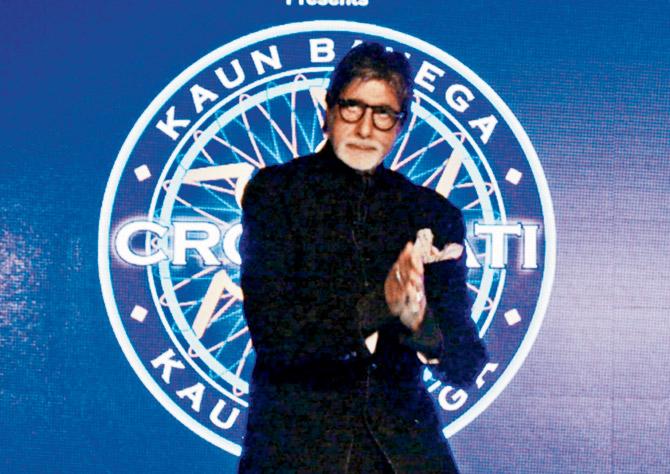For a nation obsessed with naagins on prime-time TV, what explains a top-rated quiz show running for nine seasons over 17 years?


Amitabh Bachchan on Kaun Banega Crorepati
ADVERTISEMENT
 If you look back at prime-time TV, over 17 years, on Hindi 'general entertainment channels', I guess the grand transformation would oscillate from obsession with kitchen politics ('saas-bahu' shows) to post-real love for the naagin (snake-woman).
If you look back at prime-time TV, over 17 years, on Hindi 'general entertainment channels', I guess the grand transformation would oscillate from obsession with kitchen politics ('saas-bahu' shows) to post-real love for the naagin (snake-woman).
It's mildly astounding then that a programme that's survived all this mental upheaval to stay right where it still belongs, in hearts, minds and drawing rooms of viewers across India is a frickin' quiz show — Kaun Banega Crorepati (KBC) — where you test the nation's general awareness, through multiple-choice questions, making money along the way.
What does that say about the colourful, confused Indian audience? That we're attracted to quick money — reflecting a society's eagerness to make it big in no time? Maybe. KBC pays out, on an average, around Rs 15 lakh, per contestant. But if that's all that counted then several me-too varieties of KBC after its initial success — one of them offering Rs 10 crore (hosted by Anupam Kher, Manisha Koirala, and Ashutosh Rana later) — would've done well too. They probably did for a bit.
Are we also 'janamjaat ghotus' (congenitally adept at mugging up)? Perhaps. India's examination/education system's certainly designed to test those skills. The first big winners of KBC (Harshvardhan Nawathe: Rs 1 crore; Susheel Kumar: R5 crore) were unsurprisingly IAS aspirants. The IAS exam has a 'general studies' paper, which can test you on absolutely any subject. How that makes you a good bureaucrat is beside the point.
That Indians are great at memorising is also evidently true — just glance through annual lists of spelling bee champs in the US. But quizzing isn't about memory alone. A good question is one where what's being asked, strikes an instant chord. If not, the answer is a 'wow' moment ("No way!"). Setting quiz questions is an under-rated art.
Having mildly been through the grind in school/college in Delhi, I had fair reason to believe the level of quizzing in India could match the world's best. Most of it used to be pretentious trivia. The shows would be rather boring. And then, once in a while, Siddharth Basu would come down to host a live, lively inter-school quiz, full of techno-glitz, in the '90s. It'd appear as close to a rock concert on stage. We'd feel like rock-stars. Quiz master Basu came from theatre. That's what he brought to quizzing.
It didn't surprise me then that KBC that started in 2000 — while a version of the international Who Wants To Be A Millionaire — was very much Basu's baby in India. Two hundred countries have had their own Millionaire show already. I don't know how many of them survive. The one in India is in its ninth season.
Besides entertainment to a billion-plus, KBC's greatest contribution to pop-culture is probably the killer film Slumdog Millionaire (2008). What was Slumdog's contribution to KBC? It turned it into a show about the Everyman — his life, and needs (shown as a documentary first) — instead of serial quizzards, and IAS aspirants. The audience could empathise with the winner/loser. Is that all? No.
What holds them is Amitabh Bachchan, who took a big risk getting on TV in the first place. This is how the penny dropped, when I visited the KBC set (it isn't as overwhelming as on screen) in 2012. The host had by then recorded over 550 episodes of the show, almost in real time.
Bachchan offered me a seat, speaking in his clipped Indo-British accent. During the show, he talked in chaste, Sanskritised Hindi. In between, he called a person in Munger, Bihar, for a live phone-in. He couldn't hear him properly, because of honking sounds. He turned smoothly rustic, "Eeh kaun bhopoo baja rahaa hai?" Audience was in splits.
This easy bi-culturalism can be nationally unifying sometimes. The reason for the long-running success of both KBC and Bachchan himself, I figured, seemed pretty much the same. That meeting Big B can be a prize in itself for many Indians can be gauged from crowds outside his Juhu home during 'Sunday darshans'. He's the monumental Taj Mahal. And he smiles back to tourists.
Sadly I can't bear to watch another episode of KBC for sometime— without quite slitting my wrist. Here's what happened. A Jio customer-care person comes over to my office early in the evening. I'm supposed to be the 'phone-a-friend' life-line for Afroz Shah, a lawyer, who's playing with actor Shilpa Shetty. The proceeds are supposed to go to Shah's Versova beach clean-up drive.
The customer-care person is clueless about what he's meant to do. As are the rude people we speak to on his phone. It's almost night. He calls to say he's leaving. I step out for a smoke. He calls right after to say we're up on the show. I rush up the elevator, panting down the corridor, Bachchan's on screen. As is Shah, who I've never met. He's been told I know everything.
There are 30 seconds through the question. And damn. I get it wrong. Now what? Life-long embarrassment? Yes. But Shah goes with his gut. He gets the answer right. So no guilt. Bach gaye! Why would you not be hooked to such a compelling sport, and a story— being told for 17 years!
Mayank Shekhar attempts to make sense of mass culture. He tweets @mayankw14 Send your feedback to mailbag@mid-day.com
 Subscribe today by clicking the link and stay updated with the latest news!" Click here!
Subscribe today by clicking the link and stay updated with the latest news!" Click here!






